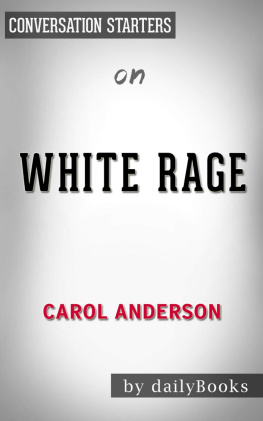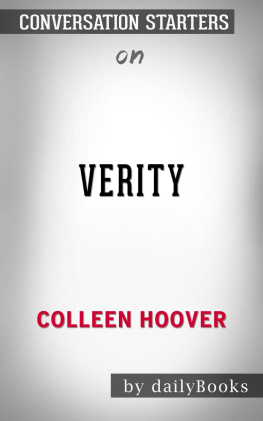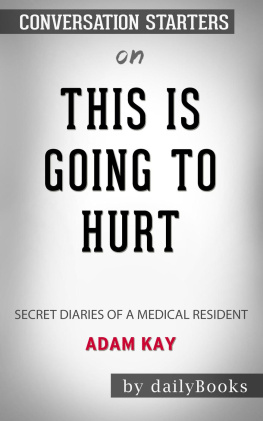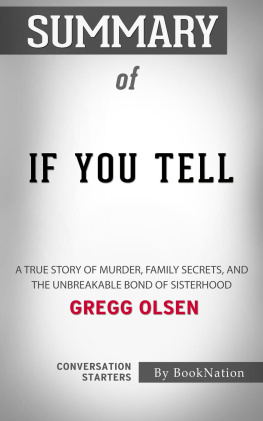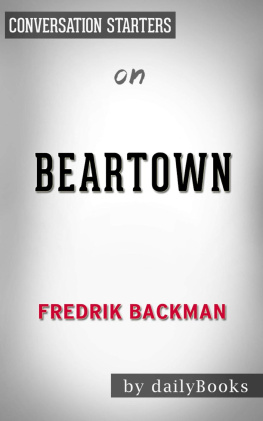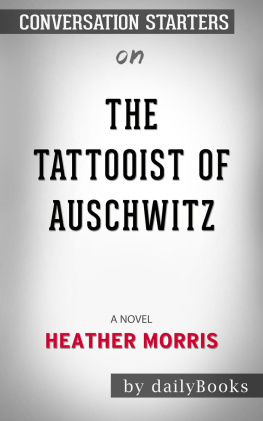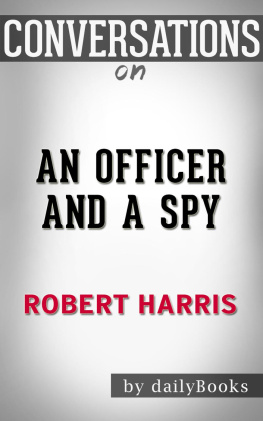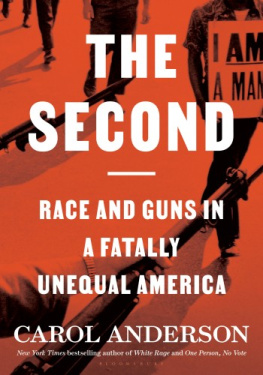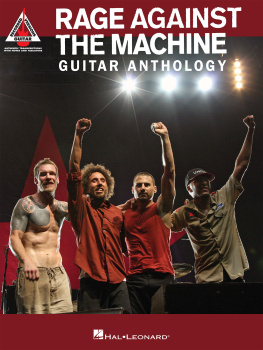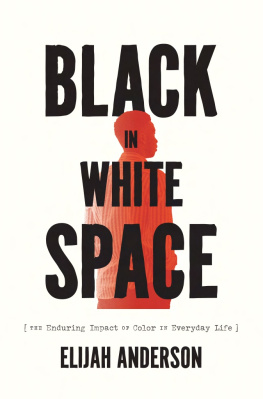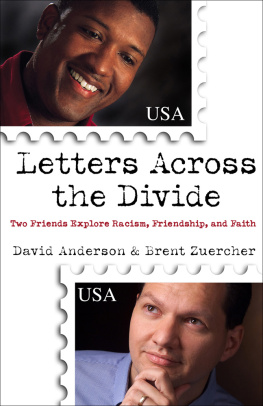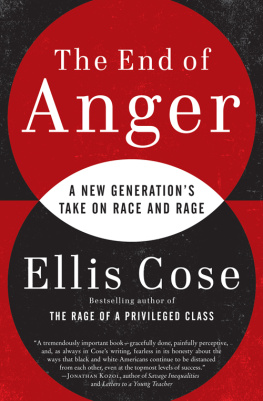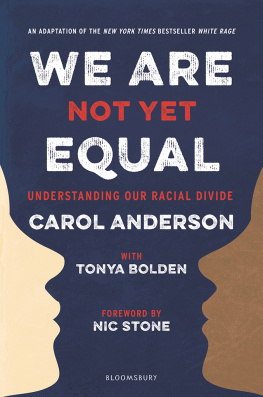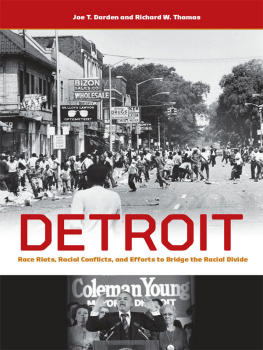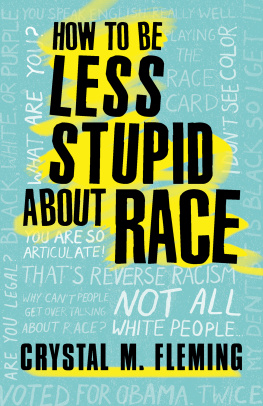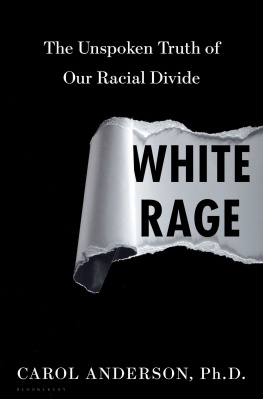Conversation Starters
for
Carol Andersons
White Rage: The Unspoken Truth of our Racial Divide
By dailyBooks
Please Note: This is an unofficial conversation starters guide. If you have not yet read the original work or would like to read it again, get the book here.
Copyright 2017 by dailyBooks. All Rights Reserved.
First Published in the United States of America 2017
We hope you enjoy this complementary guide from dailyBooks . We aim to provide quality, thought provoking material to assist in your discovery and discussions on some of todays favorite books.
Disclaimer / Terms of Use: Product names, logos, brands, and other trademarks featured or referred to within this publication are the property of their respective trademark holders and are not affiliated with dailyBooks. The publisher and author make no representations or warranties with respect to the accuracy or completeness of these contents and disclaim all warranties such as warranties of fitness for a particular purpose. This guide is unofficial and unauthorized. It is not authorized, approved, licensed, or endorsed by the original book's author or publisher and any of their licensees or affiliates.
No part of this publication may be reproduced or retransmitted, electronic or mechanical, without the written permission of the publisher.
Tips for Using dailyBooks Conversation Starters:
EVERY GOOD BOOK CONTAINS A WORLD FAR DEEPER THAN the surface of its pages. The characters and their world come alive through the words on the pages, yet the characters and its world still live on. Questions herein are designed to bring us beneath the surface of the page and invite us into the world that lives on. These questions can be used to:
- Foster a deeper understanding of the book
- Promote an atmosphere of discussion for groups
- Assist in the study of the book, either individually or corporately
- Explore unseen realms of the book as never seen before
About Us:
THROUGH YEARS OF EXPERIENCE AND FIELD EXPERTISE, from newspaper featured book clubs to local library chapters, dailyBooks can bring your book discussion to life. Host your book party as we discuss some of todays most widely read books.
Table of Contents
Introducing White Rage: The Unspoken Truth of our Racial Divide
T he multi-awarded book White Rage: The Unspoken Truth of our Racial Divide by Carol Anderson gives a historical account of the state forces that have opposed African-American progress while engineering preferential treatment for whites in America. The riots that erupted in Ferguson, Missouri in August 2014 reignited the racial question when media commentators termed the Ferguson event a case of black rage. Anderson, who teaches African American history in Emory University, suggested in an op-ed in The Washington Post that it was in fact, white rage at work. White Rage is an expanded account of Andersons argument. She explains the structural racism that had been at work in American history as a result of white anger and resentment. She starts her account at the time of the Reconstruction, the decade in the wake of the Civil War, when America was at the crossroads, between its slaveholding past and the possibility of a truly inclusive, vibrant democracy. Post-Reconstruction revolts against black emancipation are recounted, including President Johnsons moves to oppose the enfranchisement of blacks, the terrorism waged by the Klan, the enactment of the Black Codes and peonage, and the white efforts to block African Americans fleeing repression during the Great Migration. Anderson also tells how the Supreme Court repeatedly denied constitutional protection for blacks, including its ratification of legal apartheid known as Jim Crow. She cites the US presidents who played various roles in pushing back advancement of African Americans since their emancipation from slavery. She claims that white rage has systematically undermined democracy, sacrificing the progress and development of the country. US history shows the courts, states, and the federal government had backed white efforts to prevent education for blacks, the cornerstone for democracy and African American mobility. She then connects the past to contemporary events including legislative and judicial moves across the country to disproportionately criminalize blacks and hinder their voting rights.
Anderson further cites the numerous times that the hard-won gains of African Americans have been eroded. After the 2008 elections when black voters, along with Latinos and Asians, rose to their highest number, state governments started requiring documents from voters - bank statements, utility bills, W-2 forms. Most economically disadvantaged voters do not have these documents. The result was disfranchisement of many black and colored voters.
In 2013, the Supreme Court struck down a key part of the Voting Rights Act that effectively removed protection against disfranchisement for African Americans. Anderson further cited that white opposition to the Supreme Court's Brown v. Board of Education has resulted to black children being trapped in segregated and unequal schools. President Ronald Reagan is singled out by Anderson for being responsible for the rollback of many civil rights won by blacks. He made massive cuts in federal programs and jobs thus preventing more blacks from enrolling in colleges. Anderson alleged that the National Security Council and the CIA during Reagan's time "manufactured and facilitated" the spread of crack in African American communities. Up to the moment when Barack Obama became president, white rage had always been triggered by historic moments that advance black rights and democracy. Andersons book does not explore efforts to overcome white rage anti-democratic actions she chronicled. Neither does she explore answers as to why white rage has been prevalent in American life. Her historical approach instead highlights the danger ahead. She cautions that white rage erupts when black progress is apparent.
White Rage is composed of five chapters namely Reconstructing Reconstruction, Derailing the Great Migration, Burning Brown to the Ground, Rolling Back Civil Rights, and How to Unelect a President. Anderson focuses on specific historic moments such as the Reconstruction, the Great Migration, Brown, and the Obama presidency to show how white rage had always been triggered by black advancements. Narratives of African American women and men are included to add real faces to the people who fought against white hostility to claim their rights as US citizens. The slim book is well-sourced with several hundred detailed footnotes. It is a stand-alone essay stretched into an extended study of America's resistance to African American advancement. It has a clear, ardent prose that makes it persuasive and readable.
It has won many book awards, cited by critics for its timely and relevant insight into todays political climate. Its awards include: National Book Critics Circle Award Winner, New York Times Bestseller, a New York Times Notable Book of the Year, a Washington Post Notable Nonfiction Book of the Year, a Boston Globe Best Book of 2016, and a Chicago Review of Books Best Nonfiction Book of 2016.
Next page
